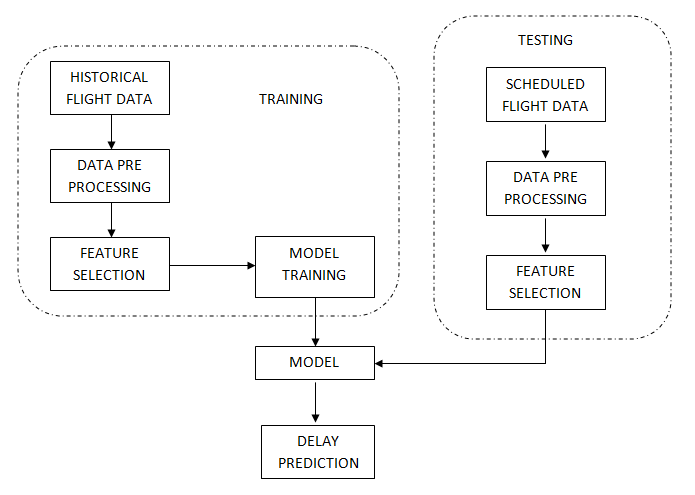Predicting Flight Delays with Error Calculation using Machine Learned Classifiers
Objective
In this project, we are using machine learning algorithms to predict the arrival of a particular flight will be delayed or not. As, flight delay is a major hurdle for airlines which depends on razor thin profit margins and for passengers as well.
Abstract
Flight delays hurt airlines, airports, and passengers. Their prediction is crucial during the decision-making process for all players of commercial aviation. Flight delays also result in airline companies operating commercial flights to incur huge losses. So, they are trying their best to prevent or avoid flight delays and cancellations.
In recent decades, the growth in airlines sector is immense and is causing traffic congestions. Delays also occurs due to non suitable weather conditions or any act of god. In this project, we will examine the flight delay data and will use machine learning techniques to predict them. We will compare Decision Tree, Bayesian ridge, Random forest and Gradient boosting algorithms.
Keywords: Flight Prediction, Machine Learning, Logistic Regression, Decision Tree, Bayesian Ridge, Random Forest, Gradient Boosting, U.S. Flight Data.
NOTE: Without the concern of our team, please don't submit to the college. This Abstract varies based on student requirements.
Block Diagram

Specifications
HARDWARE SPECIFICATIONS:
- Processor: I3/Intel
- Processor RAM: 4GB (min)
- Hard Disk: 128 GB
- Key Board: Standard Windows Keyboard
- Mouse: Two or Three Button Mouse
- Monitor: Any
SOFTWARE SPECIFICATIONS:
- Operating System: Windows 7+
- Server-side Script: Python 3.6+
- IDE: PyCharm
- Libraries Used: Pandas, Numpy, sklearn, Flask, Seaborn.
Learning Outcomes
- Importance of Supervised Learning.
- How Regression is used for predictions.
- Different metrics for regression model performance measurement.
- Uses of coefficient of determination.
- Applications of Tree based methods.
- Scope of flight delay predictions.
- Use of Boosting techniques.
- Importance of PyCharm IDE.
- How ensemble models works.
- How gradient boosting enhances a models performance.
- Process of debugging a code.
- Input and Output modules
- How test the project based on user inputs and observe the output
- Project Development Skills:
- Problem analyzing skills.
- Problem solving skills.
- Creativity and imaginary skills.
- Programming skills.
- Deployment.
- Testing skills.
- Debugging skills.
- Project presentation skills.
- Thesis writing skills.





 Paper Publishing
Paper Publishing
